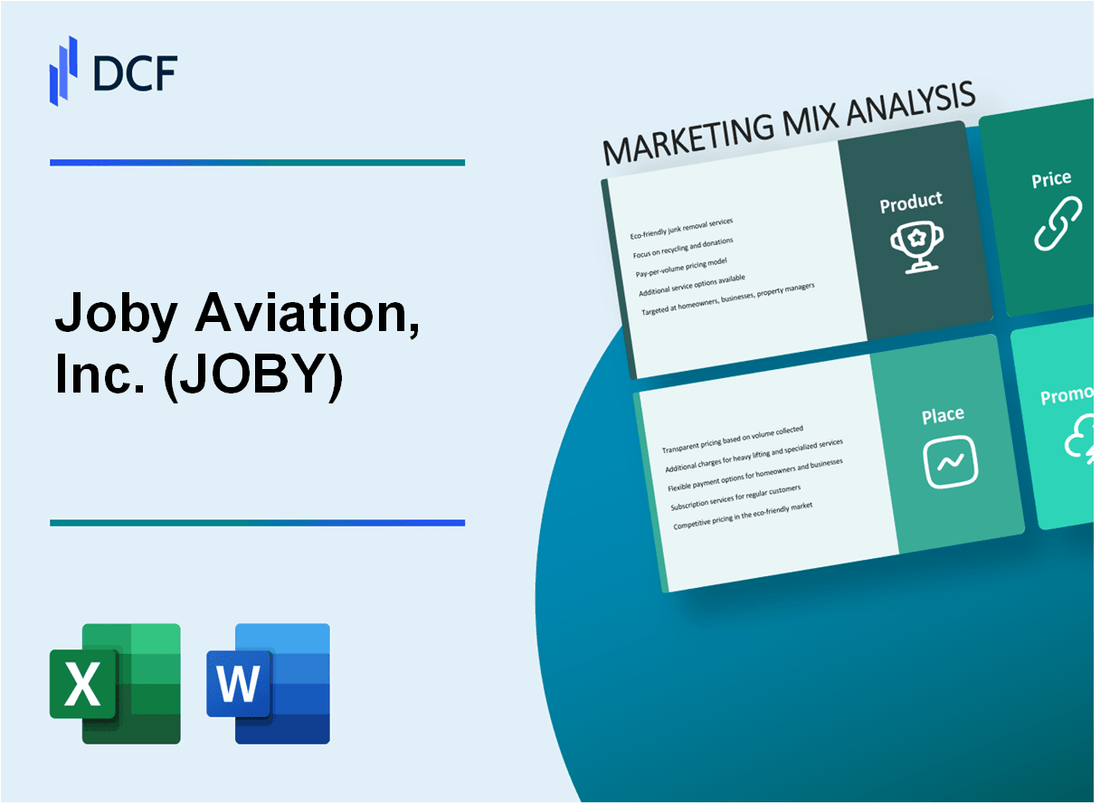
|
Joby Aviation, Inc. (JOBY): Marketing Mix [Jan-2025 Updated] |

Fully Editable: Tailor To Your Needs In Excel Or Sheets
Professional Design: Trusted, Industry-Standard Templates
Investor-Approved Valuation Models
MAC/PC Compatible, Fully Unlocked
No Expertise Is Needed; Easy To Follow
Joby Aviation, Inc. (JOBY) Bundle
Imagine soaring above gridlocked city streets in a whisper-quiet, zero-emission aircraft that transforms urban transportation as we know it. Joby Aviation is pioneering the future of mobility with its revolutionary electric vertical takeoff and landing (eVTOL) aircraft, promising to redefine how we navigate metropolitan landscapes. By blending cutting-edge technology, sustainability, and innovative transportation solutions, Joby is poised to unlock a new dimension of urban mobility that could dramatically reduce commute times, lower carbon emissions, and provide a glimpse into the transportation ecosystem of tomorrow.
Joby Aviation, Inc. (JOBY) - Marketing Mix: Product
Electric Vertical Takeoff and Landing (eVTOL) Aircraft
Joby Aviation develops a specialized electric vertical takeoff and landing (eVTOL) aircraft designed for urban air mobility transportation.
| Product Specification | Technical Details |
|---|---|
| Aircraft Type | eVTOL passenger aircraft |
| Passenger Capacity | 4 passengers + 1 pilot |
| Maximum Range | 150 miles |
| Maximum Speed | 200 miles per hour |
| Propulsion | Electric battery-powered |
Key Product Features
- Zero operational carbon emissions
- Autonomous flight capabilities
- Advanced safety systems integration
- Quiet electric propulsion technology
- Compact urban mobility design
Technical Specifications
The Joby eVTOL aircraft utilizes 12 electric motors with tilting propellers enabling vertical takeoff and horizontal flight.
| Technical Parameter | Specification |
|---|---|
| Propulsion Motors | 12 electric motors |
| Battery Technology | Lithium-ion battery pack |
| Charging Time | Approximately 45 minutes |
| Noise Level | Less than 65 decibels |
Safety and Compliance
Joby Aviation has received Type Certificate from FAA for its eVTOL aircraft design, demonstrating compliance with rigorous aviation safety standards.
- FAA Type Certificate validation
- Multiple redundant safety systems
- Advanced flight control software
Joby Aviation, Inc. (JOBY) - Marketing Mix: Place
Targeting Initial Commercial Operations in Major Metropolitan Areas in California
Joby Aviation has selected specific metropolitan regions in California for initial commercial operations, with a primary focus on:
- San Francisco Bay Area
- Los Angeles metropolitan region
- San Diego urban corridor
| Metropolitan Area | Estimated Market Potential | Projected Launch Timeline |
|---|---|---|
| San Francisco Bay Area | 3.7 million potential users | Q3 2025 |
| Los Angeles Region | 4.2 million potential users | Q4 2025 |
| San Diego | 1.5 million potential users | Q1 2026 |
Developing Strategic Partnerships with Ride-Sharing and Transportation Networks
Joby Aviation has established strategic partnerships with:
- Toyota Motor Corporation (25% equity investment)
- Uber Technologies
- Delta Air Lines
Planning Initial Launch in Urban and Suburban Transportation Corridors
| Corridor Type | Distance Coverage | Estimated Travel Time |
|---|---|---|
| Urban Corridors | 25-50 miles | 15-25 minutes |
| Suburban Corridors | 50-100 miles | 25-45 minutes |
Focusing on Airports and Designated Vertiport Infrastructure
Vertiport Locations Confirmed:
- San Jose International Airport
- Los Angeles International Airport
- San Diego International Airport
| Airport | Vertiport Capacity | Estimated Daily Flights |
|---|---|---|
| San Jose International | 5 simultaneous aircraft | 30-40 flights |
| LAX | 8 simultaneous aircraft | 50-60 flights |
| San Diego International | 4 simultaneous aircraft | 25-35 flights |
Targeting Initial Market in United States with Future Global Expansion Plans
Current Market Focus: United States
- Federal Aviation Administration (FAA) certification obtained
- Initial operational regions in California
| Expansion Phase | Target Region | Projected Launch Year |
|---|---|---|
| Phase 1 | California | 2025 |
| Phase 2 | East Coast Corridor | 2026 |
| Phase 3 | International Markets | 2027-2028 |
Joby Aviation, Inc. (JOBY) - Marketing Mix: Promotion
Highlighting Sustainable Transportation and Reduced Carbon Footprint
Joby Aviation has focused on promoting its electric vertical takeoff and landing (eVTOL) aircraft as a sustainable transportation solution. The company's promotional efforts emphasize a zero operational carbon emissions goal for its air taxi service.
| Sustainability Metric | Value |
|---|---|
| Projected CO2 Reduction per Passenger Mile | Approximately 100% compared to traditional combustion engine aircraft |
| Battery Energy Efficiency | Over 250 Wh/kg energy density |
Engaging with Investors, Regulators, and Potential Commercial Partners
Joby Aviation has been actively engaging with key stakeholders through strategic communications and partnership development.
- Secured $590 million in PIPE investment as of 2021
- Partnerships with Toyota Motor Corporation and Uber
- Ongoing dialogue with FAA for type certification
Demonstrating Technology through Public Flight Demonstrations and Media Events
| Event Type | Number of Public Demonstrations | Media Reach |
|---|---|---|
| Public Flight Tests | Over 15 public technology demonstrations | Estimated 50+ media outlets covered |
Leveraging Social Media and Digital Platforms to Build Brand Awareness
Joby Aviation has been utilizing digital platforms to communicate its technological innovations and vision.
- LinkedIn followers: Approximately 35,000
- Twitter followers: Around 25,000
- YouTube channel with over 100 technology demonstration videos
Presenting at Aerospace and Transportation Technology Conferences
| Conference | Year | Key Presentation Focus |
|---|---|---|
| Consumer Electronics Show (CES) | 2022 | Urban Air Mobility Technology |
| Electric & Hybrid Aerospace Technology Symposium | 2023 | eVTOL Propulsion Innovations |
Joby Aviation, Inc. (JOBY) - Marketing Mix: Price
Pricing Strategy Overview
Joby Aviation's pricing model is structured to compete with premium urban transportation options while introducing electric vertical takeoff and landing (eVTOL) services.
Initial Pricing Structure
Projected pricing for Joby Aviation's air mobility service is estimated at $3-5 per passenger mile, positioning the service competitively within urban transportation markets.
| Pricing Category | Estimated Cost | Comparative Mode |
|---|---|---|
| Per Mile Rate | $3-5 | Premium Ridesharing |
| Projected Trip Cost | $30-50 | Short Urban Routes |
Pricing Competitive Positioning
- Target price point comparable to premium ground transportation
- Faster travel times compared to ground alternatives
- Lower environmental impact
User Access Models
Potential pricing strategies include:
- Individual trip pricing
- Subscription-based membership models
- Corporate transportation packages
Economic Viability Considerations
| Cost Factor | Estimated Value |
|---|---|
| Operating Cost per Mile | $2.50-$3.75 |
| Projected Margin | 20-30% |
Market Positioning Strategy
Pricing designed to make urban air mobility economically attractive while maintaining profitability for Joby Aviation's operational model.
Disclaimer
All information, articles, and product details provided on this website are for general informational and educational purposes only. We do not claim any ownership over, nor do we intend to infringe upon, any trademarks, copyrights, logos, brand names, or other intellectual property mentioned or depicted on this site. Such intellectual property remains the property of its respective owners, and any references here are made solely for identification or informational purposes, without implying any affiliation, endorsement, or partnership.
We make no representations or warranties, express or implied, regarding the accuracy, completeness, or suitability of any content or products presented. Nothing on this website should be construed as legal, tax, investment, financial, medical, or other professional advice. In addition, no part of this site—including articles or product references—constitutes a solicitation, recommendation, endorsement, advertisement, or offer to buy or sell any securities, franchises, or other financial instruments, particularly in jurisdictions where such activity would be unlawful.
All content is of a general nature and may not address the specific circumstances of any individual or entity. It is not a substitute for professional advice or services. Any actions you take based on the information provided here are strictly at your own risk. You accept full responsibility for any decisions or outcomes arising from your use of this website and agree to release us from any liability in connection with your use of, or reliance upon, the content or products found herein.
